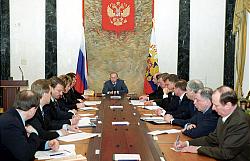 |
|
Itar-Tass / AP
President Vladimir Putin
announcing the sweeping reshuffle to ministers and Kremlin
aides at the Cabinet meeting on Tuesday.
|
President Vladimir Putin announced a sweeping reshuffle of security
posts Tuesday, putting his ally Viktor Cherkesov in charge of a
new federal anti-drug agency and strengthening the Federal Security
Service by giving it the border guards and communication agency
FAPSI.
The changes are largely in line with measures taken by the United
States and other Western countries after Sept. 11 to counter the
threat of terrorism, analysts said. Some suggested that Tuesday's
reshuffle might be a first step in a government overhaul, with
Putin starting with the more manageable security sector and then
moving into the economic arena.
In announcing the changes, Putin told a Cabinet meeting that
they were aimed at increasing efficiency between government agencies
in fighting terrorism and the growing drug problem.
Putin's spokesman Alexei Gromov said later in the day that the
reform will cut costs and bureaucracy while removing overlapping
responsibilities between government agencies.
As part of the reshuffle, the Tax Police has been disbanded,
with its duties to prevent and investigate tax evasion going to
the Interior Ministry. Its buildings, funding and equipment will
be used to build the new State Committee for the Control of Narcotics
and Psychotropic Substances.
The new agency's powers are largely unclear. While the Interior
Ministry employs about 7,000 officials in its anti-drug department,
the new agency will have about 40,000 people, the Interior Ministry
said in a statement. The ministry's anti-drug unit will be shut
down.
FAPSI, or the Federal Agency for Government Communications and
Information, is being abolished and divvied up between the FSB
and the Defense Ministry. FAPSI was in charge of the government's
coded communications and electronic intelligence, and was broken
out of the KGB in late 1991.
The Federal Border Service is also being returned to the FSB
and will be headed by deputy FSB director Vladimir Pronichev,
a former border guard who took the spotlight last October when
he was put in charge of rescue operation headquarters during the
Moscow hostage crisis.
The Tax Police and border service chiefs will move to Brussels,
Belgium. Mikhail Fradkov of the Tax Police will retain a minister's
ranking and serve as Russia's envoy to the European Union, while
the border service's head, General Konstantin Totsky, will serve
as Russia's ambassador to NATO.
FAPSI director Vladimir Matyukhin was appointed first deputy
defense minister and will head a new committee in charge of weapons
procurement for the power agencies.
"This is a balanced decision that has been supported by
each of the power agencies involved," Putin said in televised
comments.
While some of the changes can be made by presidential decree,
others will require amendments to the law. Putin said he is sending
the necessary bills to the State Duma, along with another package
of bills to liberalize the Criminal Code (See story, Page 3).
Most politicians welcomed Tuesday's reshuffle as a first step
in long-awaited administrative reforms or said it meant little
to the political landscape. Some liberal politicians warned that
strengthening the FSB's powers might prove dangerous.
"I see in this a sharp increase in the weight of the FSB,
which is acquiring the traits of the KGB," said Boris Nadezhdin,
deputy head of the Unity of Right Forces faction in the Duma.
Other liberals, such as Deputy Duma Speaker Irina Khakamada and
Yabloko leader Grigory Yavlinsky, supported the changes as a step
toward efficiency and a sign that Putin is making the drug problem
a priority.
Communist leader Gennady Zyuganov said he saw little new in Putin's
policy.
"The country needs a new course, a new strategy and a strong
team, and all we see here is personnel castlings," he was
quoted by Interfax as saying. "There aren't any fresh and
bright faces that could provide a breakthrough. The president
is reshuffling the same stack of cards."
Kremlin-connected political analyst Sergei Markov said the growth
of the FSB's functions is in line with a global tendency to reinforce
and integrate security agencies.
The KGB was split into several power agencies after the 1991
coup attempt, when the country faced no security threats but did
face a threat to democracy from the KGB, Markov said.
"Today, the priorities have changed," he said. "The
main threat now is a security threat. And while we should not
disregard any threat to democracy, this should be resolved by
making civil society stronger and not by making the security agencies
weaker."
By putting his personal friend Cherkesov in charge of the anti-drug
agency, Putin has highlighted one of Russia's biggest domestic
and international problems -- the trafficking of drugs through
Russia, Markov said. He said the agency might grow into an organization
charged with fighting all forms of organized crime.
Khakamada also said the powers of the anti-drug agency are likely
to be broadened some day.
Markov said the move is in part connected with the upcoming election
season. "Everybody tells the Kremlin that if it keeps doing
nothing, the Communists will get more votes than the [pro-Kremlin]
United Russia party," he said.
The reshuffle is one of the few government shake-ups that Putin
has made during his almost three years as president, and is raising
questions about whether further changes are in the offing -- particularly
in the economic arena now controlled by Prime Minister Mikhail
Kasyanov.
The power ministries are dominated by the so-called Chekists
-- largely former KGB officials from St. Petersburg -- while economics
are thought to be controlled by the "family" of politicians
and businessmen who rose to power during Boris Yeltsin's presidency.
"Today, the St. Petersburgers have obviously won,"
NTV television commentator Vladimir Kondratyev said in an evening
broadcast. "It remains to be seen how the family will respond."
|